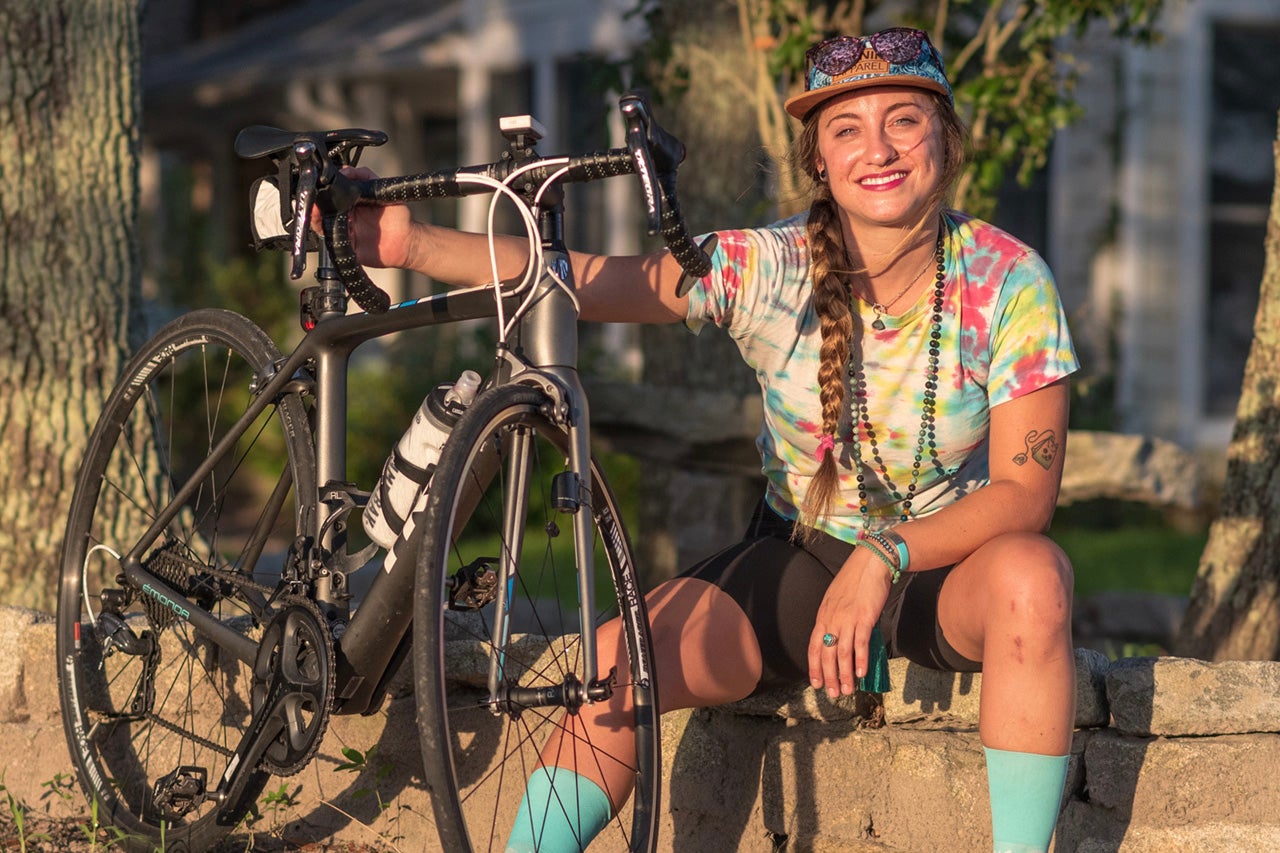Sometimes the simplest solution is the most powerful. At least graduate student Sylvie Baele ’14 thinks so. Baele took first place in the inaugural Sturcken Memorial Oratorical competition on Oct. 13, 2018, for her proposal to use bicycling as a way to increase access and equity on the College of Charleston campus.
In her speech, Baele, who is pursuing her graduate degree in the College’s dual environmental studies/public administration program, laid out her vision for how CofC can better serve students from a diverse set of socioeconomic needs with just two wheels. Dubbed the Better Bicycling Initiative, Baele’s plan includes a CofC course, ideally a First Year Seminar, that would teach students bicycle safety, maintenance and basic repair, and best commuting practices for cycling. A second prong of the program would include a student-run bicycle co-op where students could practice and share their cycling skills with the campus community.
Baele estimates that if students can avoid expenses incurred from owning a car (gas, maintenance, parking, car payment, insurance etc.) while attending CofC, they could save as much as $3,500 per academic year or $14,000 over four years.
“Bicycles, when used as a primary mode of transportation, are the intertwining link between resilient social, economic and environmental adaptation,” Baele said in her speech. “They are instruments of social justice and revolutionize mobility.”
It was the clarity of her plan that made Baele’s speech stand out, says Honors College student Tanner Crunelle, founder of the Sturcken Memorial Oratorical competition.
“Sylvie’s proposal convincingly linked environmental sustainability with the larger social realities we live in,” says Crunelle.” Asking to practice identifying these complex interrelationships is perhaps one of the greatest hopes we have at making the world a better place.”
RELATED: Find out how Tanner Crunelle learned about Francis Sturcken’s inspiring speech.
Named for Francis “Frank” Sturcken ’51, the competition honors the alumnus’ 1951 speech “The Liquid South,” which advocated for desegregation of the College of Charleston. Sturcken donated his personal papers, including a manuscript of his speech, to the Avery Research Center for African American History and Culture in 2001. He died in 2006.
Members of Sturcken’s family, including his daughter Elizabeth Sturcken, attended the competition, which was sponsored by numerous campus offices and academic departments, including the Division of Student Affairs, the Avery Research Center, the Office of Sustainability, and the Sustainability Literacy Institute.
“I’m sure Dad’s looking down and just thrilled at this and excited that something he did over 60 years ago can create change today,” Elizabeth Sturcken said during the event.
In an interview, Elizabeth Sturcken said she was inspired by Crunelle’s passion for creating a platform for social change at the College and deeply moved that her father was the impetus for that idea.
“For this thing that’s locked in history to come to the present and be a beacon for how we can all have courage and how we can all create change and to see this young man do it, it gives you hope,” said Elizabeth Sturcken, noting that as a result of her father’s speech in 1951, he and his family, who lived in Charleston, were socially shunned. “For me it creates this connective tissue across time and space.”
As first place winner, Baele won $500 and support from a network of campus offices to work toward the implementation of her bicycle initiative. The second place winner, Sean Dalton, received $200 and the remaining participants each received $100. The physical award presented to Baele was made by the Phillip Simmons Foundation, a non-profit organization devoted to preserving the legacy and craft of the late Charleston blacksmith Philip Simmons.
The goal of the competition, says Crunelle, who is a junior majoring in English, is to not only provide students with a platform to raise social issues on campus, but to also give them a chance to create meaningful change.
“I was encouraged to see how sensitive my peers were, both to the needs of our campus and to the needs of themselves and others,” he says. “One of the best ways to inspire social progress is by speaking truth through our stories, and all the students who competed cleverly connected this to a set of actions we can take as an institution.”
And Baele’s proposal was very personal. She started life at CofC as an Honors College student with a full scholarship in 2008. A year later, she was kicked out of college after her GPA plummeted to a 1.2. Hopeless and struggling financially, Baele, under the power of a rusty, old Schwinn bicycle, pedaled her way to work, saved up money and reapplied to CofC after taking classes at Trident Technical College. She was eventually readmitted to the College, and completed a bachelor’s degree in international studies before enrolling as a graduate student.
Today, Baele is living her truth for social change as the event planning and outreach coordinator for the nonprofit Second Chance Bikes, an organization that provides refurbished bicycles to qualifying Charleston residents who need access to equitable and affordable transportation.
With ongoing challenges of gentrification and the rising cost of living in the Holy City, Baele is passionate about pushing the College – and the City of Charleston – to promote cycling as an affordable mode of transportation.
“It may seem silly to some, but I really think that bikes are a really easy way to make the College a little more diverse from a socio-economic standpoint,” she says.
Featured image: Sturcken Memorial Oratorical competition winner Sylvie Baele. (Photo provided)






